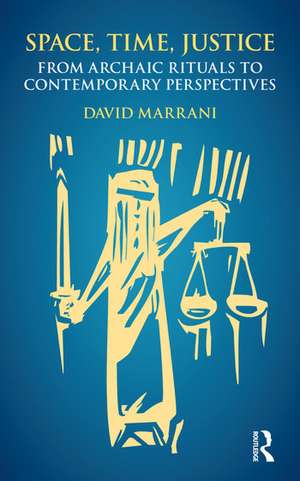Space, Time, Justice: From Archaic Rituals to Contemporary Perspectives
Autor David Marranien Limba Engleză Hardback – 16 noi 2017
| Toate formatele și edițiile | Preț | Express |
|---|---|---|
| Paperback (1) | 389.66 lei 6-8 săpt. | |
| Taylor & Francis – 14 aug 2020 | 389.66 lei 6-8 săpt. | |
| Hardback (1) | 762.97 lei 6-8 săpt. | |
| Taylor & Francis – 16 noi 2017 | 762.97 lei 6-8 săpt. |
Preț: 762.97 lei
Preț vechi: 1026.69 lei
-26% Nou
Puncte Express: 1144
Preț estimativ în valută:
146.00€ • 150.85$ • 121.45£
146.00€ • 150.85$ • 121.45£
Carte tipărită la comandă
Livrare economică 19 martie-02 aprilie
Preluare comenzi: 021 569.72.76
Specificații
ISBN-13: 9781138703254
ISBN-10: 1138703257
Pagini: 160
Ilustrații: 2 Tables, black and white; 9 Illustrations, black and white
Dimensiuni: 156 x 234 x 14 mm
Greutate: 0.39 kg
Ediția:1
Editura: Taylor & Francis
Colecția Routledge
Locul publicării:Oxford, United Kingdom
ISBN-10: 1138703257
Pagini: 160
Ilustrații: 2 Tables, black and white; 9 Illustrations, black and white
Dimensiuni: 156 x 234 x 14 mm
Greutate: 0.39 kg
Ediția:1
Editura: Taylor & Francis
Colecția Routledge
Locul publicării:Oxford, United Kingdom
Public țintă
PostgraduateCuprins
Introduction
Chapter One: Transgression as the 'big bang' of society
Chapter Two: Judicial spaces and ritual(s) of justice. The relation between time and space in the trial
Chapter Three: Contemporary spaces of justice: use and abuse of transparency
Chapter Four: The abolition of the judicial walls: cameras in courts and the reshaping of judicial spaces
Chapter 5: Conclusion
Chapter One: Transgression as the 'big bang' of society
Chapter Two: Judicial spaces and ritual(s) of justice. The relation between time and space in the trial
Chapter Three: Contemporary spaces of justice: use and abuse of transparency
Chapter Four: The abolition of the judicial walls: cameras in courts and the reshaping of judicial spaces
Chapter 5: Conclusion
Recenzii
David Marrani approaches the study of contemporary institutions of justice carrying a rich multidisciplinary toolbox. He uses the tools of philosophy, particularly work associated with structuralism and post structuralism, psychoanalysis, Freud and Lacan, anthropology, art criticism, architecture, film theory, and jurisprudence to name a few to reflect on a number of pressing issues intimately associated with the delivery of justice. Chapters include a study of judicial authority and courtroom ritual. Two others explore the space of justice. One examines the modern architectural jurisprudential preoccupation with transparency revealing the new opacity that it generates. The second focuses on the impact of the dematerialization of justice, as cameras turn the institutions of justice into just another TV show. This is a rich, thoughtful and provocative study that is a must read for anyone interested in the nature and place of justice in contemporary society.
Leslie J Moran Professor of Law, Birkbeck College London
Leslie J Moran Professor of Law, Birkbeck College London
Descriere
This book merges philosophical, psychoanalytical and legal perspectives to explore how spaces of justice are changing and the effect this has on the administration of justice. It covers: idea of transgression as starting point of the question of justice; relation between spaces of justice and ritual; question of use and abuse of transparency.
Notă biografică
Dr David Marrani studied law, philosophy and psychoanalysis in France and in the UK. He is professor and director at the Institute of Law, Jersey. He teaches undergraduate and postgraduate students on Common Law Reasoning, Comparative Law, Comparative Public Law, Jurisprudence and Critical Studies. He is a Visiting Professor at several European and International universities. His research relates to comparative public law and the intersections between law, philosophy and psychoanalysis. He is series general editor for Routledge Research in Constitutional Law and the SLS convenor for comparative law.
